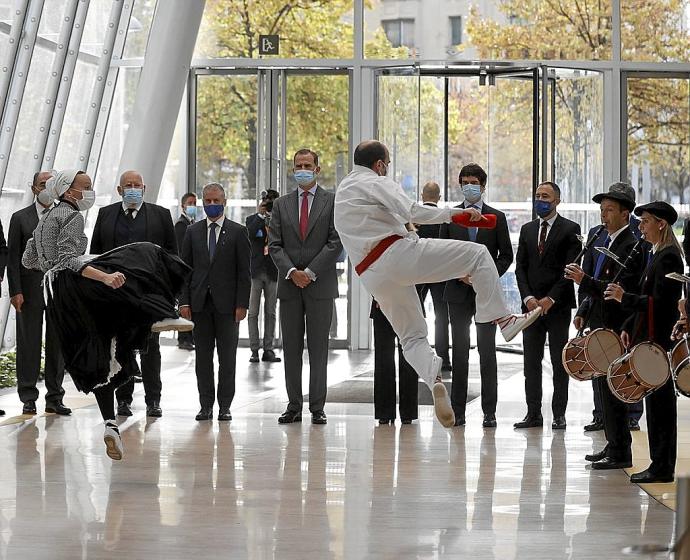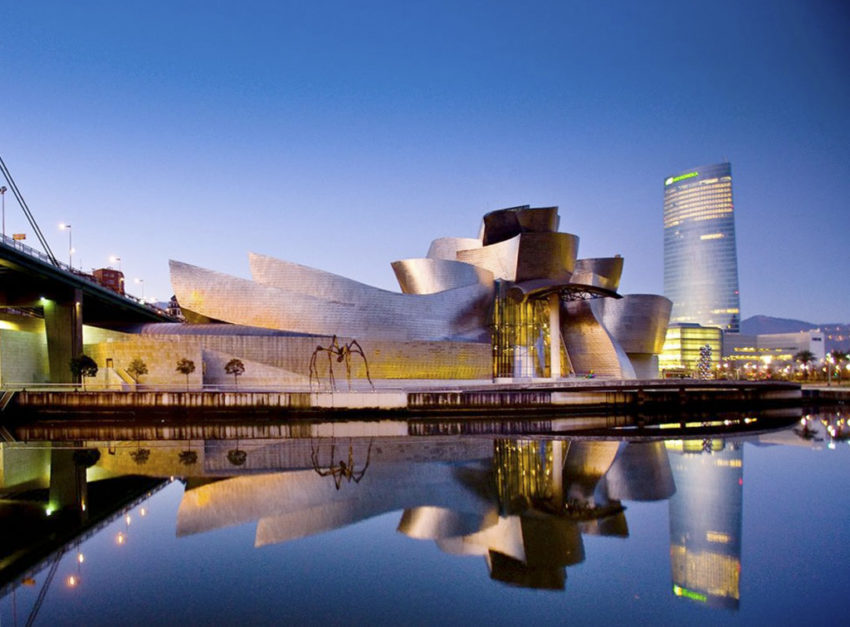A large institutional representation closes in Bilbao, Basque Country, one of its two annual events.
Una nutrida representación institucional clausura en Bilbao el evento empresarial.
More than fifty presidents and executives of the largest companies in the European Union met this weekend in Bilbao to analyze the energy transition, a meeting that was closed yesterday by King Felipe VI during an event that was also attended by the president of the Basque Government, Iñigo Urkullu, the deputy general of Bizkaia, Unai Rementeria, the vice president of the Spanish Government Nadia Calviño, the vice president of the European Commission, Frans Timmermans, and the president of Iberdrola, Ignacio Sánchez Galán.
The European Round Table for Industry (ERT) is the lobby made up of the presidents and executives of the 60 largest companies in the European Union and usually meets twice a year. On this occasion, the meeting was held in Bilbao over the weekend. It is based in Brussels and was created in 1983 to act as a lobby for European industry before the EU authorities, but also to provide a stable meeting point for the top executives of the sector on the continent.
In recent months, much of their work has been linked to the energy transition and it is not surprising, therefore, that this was the main theme of the Bilbao meeting. The executives supported the conclusions of the Glasgow climate summit, held ten days earlier, believing that it and the EU’s “Fit for 55” package can mark a milestone on the road to carbon neutrality 2 by 2050, while maintaining competitiveness and social equity in Europe.
In addition to the meeting with the European businessmen, Galán took the opportunity to show those present some of the projects being developed in the smart grid center recently inaugurated in Larraskitu. This is a center that brings together Iberdrola with companies such as Siemens, Schneider, Velatia or Arteche, with its suppliers, startups and universities to develop R&D&I projects that improve smart grids. There are already 120 projects underway with a total investment of 110 million euros. There are 200 people from different countries working in this center, as the aim is to make it a global center, looking for solutions to be applied worldwide.

Más de medio centenar de presidentes y ejecutivos de las mayores empresas de la Unión Europea se han dado cita este fin de semana en Bilbao para analizar la transición energética, un encuentro que fue clausurado ayer por el lehendakari Iñigo Urkullu; el diputado general de Bizkaia, Unai Rementeria; la vicepresidenta del Gobierno español Nadia Calviño; el vicepresidente de la Comisión Europea, Frans Timmermans; y el presidente de Iberdrola, Ignacio Sánchez Galán, con la presencia del monarca español, Felipe VI.

La Mesa Europea para la Industria (ERT) es el lobby que integran los presidentes y ejecutivos de las 60 mayores empresas de la Unión Europea y suele reunirse dos veces al año. En esta ocasión la cita ha sido en Bilbao durante todo el fin de semana. Tiene su sede en Bruselas y se creó en 1983 para actuar como lobby de la industria europea ante las autoridades comunitarias, pero también para propiciar un punto de encuentro estable de los primeros ejecutivos del sector del continente.
En los últimos meses, gran parte de su trabajo ha estado vinculado con la transición energética y no es de extrañar, por tanto, que éste haya sido el tema principal del encuentro de Bilbao. Los ejecutivos apoyaron las conclusiones de la cumbre climática de Glasgow, celebrada diez días antes, al opinar que ésta y el paquete Fit for 55 de la UE pueden marcar un hito en el camino hacia la neutralidad del carbono 2 para 2050, manteniendo al mismo tiempo la competitividad y la equidad social en Europa.
Además del encuentro con los empresarios europeos, Galán aprovechó para mostrar a los presentes algunos proyectos que se desarrollan en el centro de redes inteligentes que ha inaugurado recientemente en Larraskitu. Se trata de un centro que reúne a Iberdrola con empresas como Siemens, Schneider, Velatia o Arteche, con sus proveedores, startups y universidades para desarrollar proyectos de I+D+I que mejores las redes inteligentes. Ya están en marcha 120 proyectos que suman 110 millones de euros de inversiones. Trabajan en este centro 200 personas de diferentes países, ya que el objetivo es que sea un centro global, que busque soluciones para aplicar en todo el mundo.


